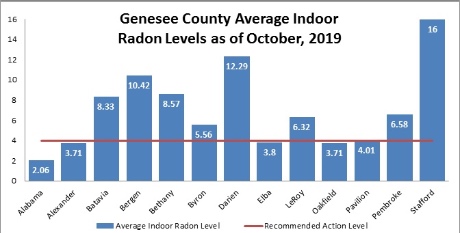Public Health Column: November is Lung Cancer Awareness Month
From the Genesee County Health Department:
November is Lung Cancer Awareness Month! Did you know that radon is the second leading cause of lung cancer?
According to the Environmental Protection Agency (EPA) and the Surgeon General’s office, radon is responsible for more than 20,000 lung cancer deaths each year in the United States. Fortunately, radon induced lung cancer can be prevented.
Radon is a radioactive gas that forms naturally when elements (uranium, thorium, or radium) break down in rocks, soil and groundwater.
People can be exposed to high levels of radon from breathing in the toxic gas when it seeps into homes and buildings through cracks or gaps in the foundation.
“When you breathe in radon, radioactive particles from radon gas can get trapped in your lungs” said Sarah Balduf, Environmental Health director of Genesee and Orleans counties. “Over time, these radioactive particles increase the risk of lung cancer. It may take years before health problems appear.”
People who smoke and are exposed to radon are at a greater risk of developing lung cancer. The only way to know if your house has high levels of radon is to test for it.
The EPA recommends taking action to reduce radon in homes that have a radon level at or above 4 picocuries per liter (pCi/L). In Genesee County, the average indoor radon level is 5.74 pCi/L compared to the State average of 4.42 pCi/L2.
Below is a graph of the towns in Genesee County and their average indoor radon screening level. These screening levels reflect tests that were administered in the basement.

Any radon exposure has some risk of causing lung cancer. If your home has a radon level at or above 4 pCi/L, a certified radon mitigator can install a radon reduction system that will ventilate the radon out of the air within your home. The lower the radon levels are in your home, the lower your family’s risk of lung cancer.
About the Genesee County Health Department Radon Program
The program has a limited supply of free short-term radon test kits available to Genesee County residents. These kits are available on a first-come-first-serve basis. The program also offers educational materials and in-services programs on the danger of radon and mitigation options for new or existing homes -- all available at no charge.
Test kits are available to order through the NYSDOH website for $11 here.
Health Signs of Exposure
If you think you might have been exposed to high levels of radon over long periods of time, talk with your doctor about whether you should get regular health checkups and tests to look for possible signs of lung cancer.
Be aware of possible symptoms of lung cancer, such as shortness of breath, a new or worsening cough, pain or tightness in the chest, hoarseness, or trouble swallowing, and tell your doctor if you start to have any of these symptoms.
For more information about the Radon Program in Genesee County, please call the Genesee County Health Department at 585-344-2580, ext. 5555, or click here.
